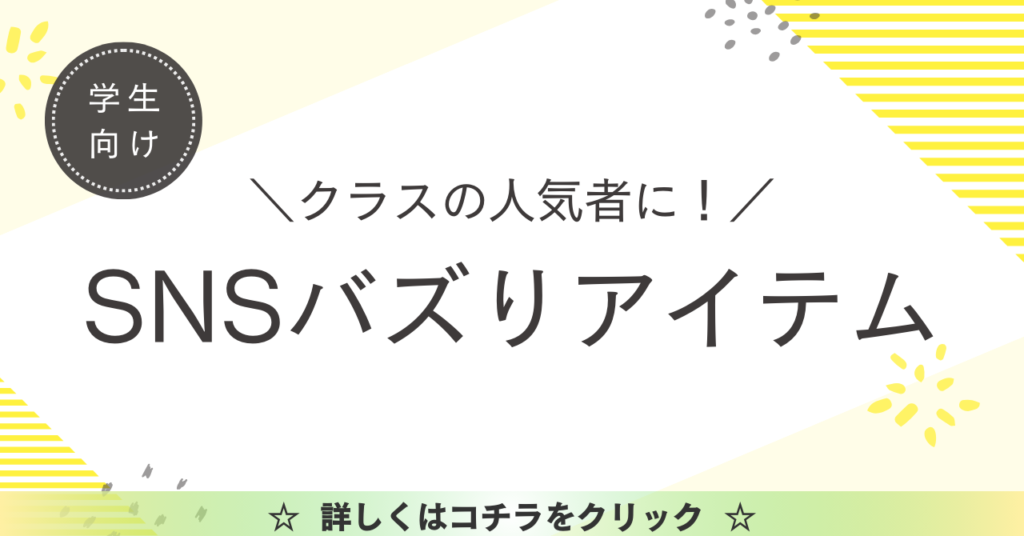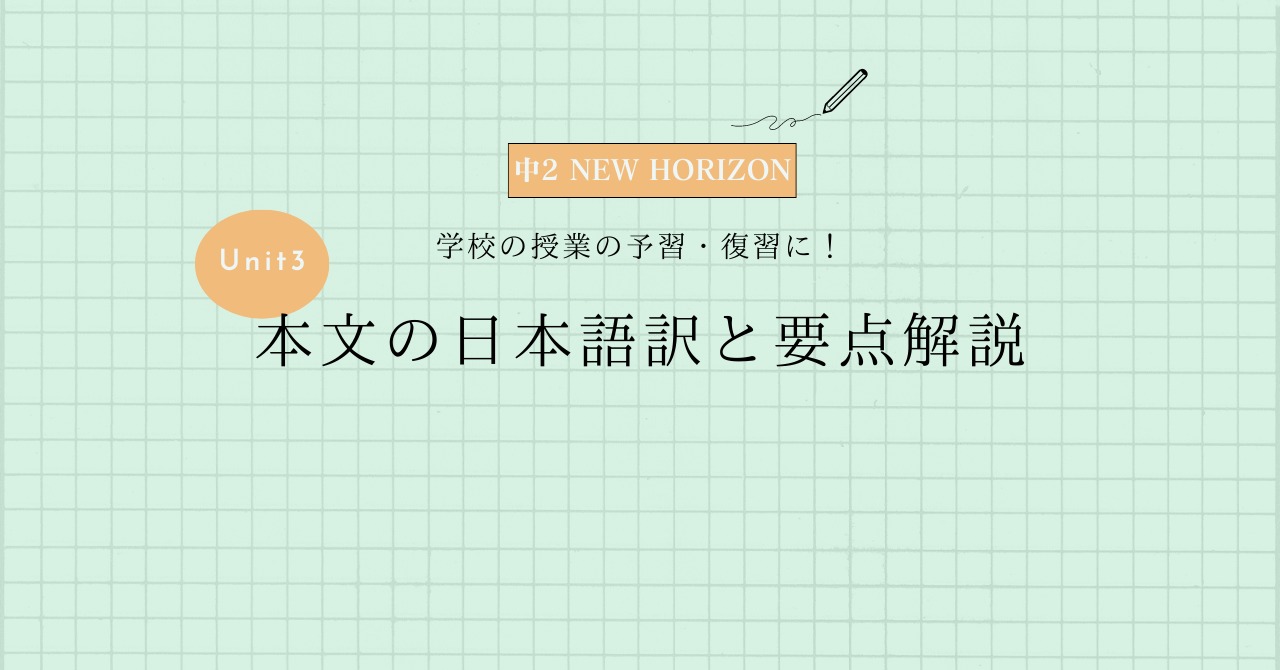東京書籍 中学2年生 NEW HORIZON(ニューホライズン) Unit3 Read & Think1の本文の日本語訳と重要箇所の解説です。
Unit3-1,3-2とRead & Think2の解説はこちらからご覧ください。
>中2NEW HORIZON Unit3 Scene1 本文和訳
>中2NEW HORIZON Unit3 Scene2 本文和訳
>中2NEW HORIZON Unit3 Read & Think2 本文和訳
- Unit3 Read & Think1 本文と日本語訳
- Unit3 Read & Think1 重要事項の解説
- Ms. Tanaka, a translator there, explained her job, and we translated some sentences.
- It was difficult, but I enjoyed it a lot.
- I knew that English is important, but I learned that there are other things to study.
- Ms. Tanaka said, “You should also have a deep knowledge of Japanese.
- You need to develop your sense of language.”
- She also said, “We have various things to translate.
- Sometimes we need general knowledge, and sometimes we need specific knowledge.
- If you are interested in something, you should continue to learn about it.
- It can be your strength in the future.”
- Unit3 Read & Think1 まとめ
Unit3 Read & Think1 本文と日本語訳
Where did Asami go on Career Day?
「アサミは職場体験の日にどこに行きましたか?」
My friends and I went to a translation company on Career Day.
「友達と私は職場体験の日に翻訳会社に行きました。」
Ms. Tanaka, a translator there, explained her job, and we translated some sentences.
「そこの翻訳家の田中さんが彼女の仕事を説明してくれて,私たちはいくつかの文章を翻訳しました。」
It was difficult, but I enjoyed it a lot.
「難しかったけどとても楽しかったです。」
I knew that English is important, but I learned that there are other things to study.
「私は英語は重要だと知っていたけど,他にも勉強すべきことがあることを学びました。」
Ms. Tanaka said, “You should also have a deep knowledge of Japanese.
「田中さんは,『あなたは日本語の深い知識も持つべきです。
You need to develop your sense of language.”
「言語の感覚を高めていく必要があります。』と言っていました。」
She also said, “We have various things to translate.
「彼女はこうも言っていました。『私たちは翻訳すべきことが色々あります。」
Sometimes we need general knowledge, and sometimes we need specific knowledge.
「一般常識が必要なときもあれば,特定の知識が必要なときもあります。」
If you are interested in something, you should continue to learn about it.
「もしあなたが何かに興味があるなら,そのことを学び続けるべきです。」
It can be your strength in the future.”
「それは将来あなたの強みになるでしょう。』」

Unit3 Read & Think1 重要事項の解説
Ms. Tanaka, a translator there, explained her job, and we translated some sentences.
“Ms. Tanaka“と“a translator there”は「同格」といって,同じものを表していますね。
名詞のあとにカンマ(,)やコロン(:)を使って別の名詞を繋げることで同格になります。
“explain”は「説明する」,”translate“は「を翻訳する」という動詞です。
“sentence”は「文」という名詞ですね。
It was difficult, but I enjoyed it a lot.
“a lot”は「たくさん,とても」という副詞です。“a lot of”は「たくさんの」という形容詞で,使い方が異なるので要注意です!
I knew that English is important, but I learned that there are other things to study.
“to study“は「不定詞の形容詞的用法」になっていますね。また,「接続詞that」も使われています。
後ろの文は「there構文」になっていますね。“thing”は「もの,こと」という名詞で,“other”は「他の」という形容詞です。
Ms. Tanaka said, “You should also have a deep knowledge of Japanese.
“should”は「~すべきだ」という助動詞で,“deep”は「深い」という形容詞,“knowledge”は「知識」という名詞ですね。
“also”は「また,さらに」といった副詞で,付け加える役割があります。色々な文で使うので必ず覚えましょう!
“of”は前置詞で,”A of B”の形で「BのA」というように後ろから前に訳します。
You need to develop your sense of language.”
“to develop”では「不定詞の名詞的用法」が使われていますね。
“need”は「を必要とする」という動詞です。“sense”は「感覚」という名詞ですね。
She also said, “We have various things to translate.
“to translate”は「不定詞の形容詞的用法」になっていますね。
various”は「様々な,色々な」という形容詞です。
Sometimes we need general knowledge, and sometimes we need specific knowledge.
“general”は「一般的な,全体的な」という形容詞で,“general knowledge”で「一般常識」となります。
“specific”は「特定の,具体的な」という形容詞になります。
“sometimes“は「時々」という意味の頻度を表す副詞です。他には“usually(普段は)”,“often(よく)”,“always(いつも)”,“never(絶対にない)”などがあります。
頻度の感覚としては,always(100%)>usually(90%)>often(70%)>sometimes(50%)>never(0%)といった具合になります。
また,頻度を表す副詞はどこに置くのかも重要です。置く位置は,文章で使われている動詞によって変化します。
一般動詞の場合はその前,be動詞の場合はその後ろに置きます。以下に例文を挙げておきます。
一般動詞:I usually play soccer on Saturdays.「土曜日にたいていサッカーをする」
be動詞:He is often sleepy.「彼はよく眠そうにしている」
If you are interested in something, you should continue to learn about it.
“to learn”では「不定詞の名詞的用法」が使われていますね。
“be interested in~”は「~に興味がある」という重要表現です。必ず覚えましょう!
“something”は「何か」という代名詞で,“continue”は「を続ける」という動詞です。
It can be your strength in the future.”
“can”は「~できる」のほかに「~だろう」という可能性の意味もあります。
“strength”は「強み,力」という名詞です。“in the future”は「将来」という重要表現です。
Unit3 Read & Think1 まとめ
以上がUnit3 Read & Think1の日本語訳となります。
ここでは「不定詞」が使われていますね。しっかり理解していきましょう!
>中2NEW HORIZON Unit3 Scene1 本文和訳
>中2NEW HORIZON Unit3 Scene2 本文和訳
>中2NEW HORIZON Unit3 Read & Think2 本文和訳
何か分からない点や他に解説してほしい点があれば,お気軽にコメントしてください!



コメント